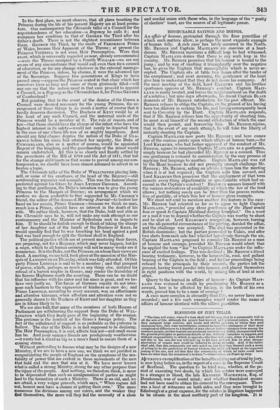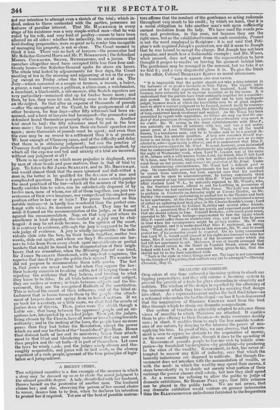BLESSINGS OF JURY TRIALS.
"The time will come, when if a man shall tell his son, that in a community rich in all the arts of life, although the people had learned and profound judges, to whom they assigned large salaries, and acute and skilful pleaders, to whom they paid enormous fees, they were nevertheless content to leave the settlement of their most complicated differences to a handful of men chosen indiscriminately from among the common people, neither learned nor profound nor acute nor skilful, unacquainted with the general principles or particular details of law, without characters to support, and without responsibility to which to appeal,—the time will come, when if a man shall tell this to his son, the boy will look up in his face and ask him by what strange aberration of reason men could be induced to act so absurdly. And if the father shall add, that this community not only acted so, but that they deemed such a mode of acting to be the perfection of human wisdom, the alibi will laugh at the supposed jesting of his sire, and tell him that the community of which he talks could have been no other than the inmatesof abedlam."—Obserrarions on Trials by Jury.
AlcuRious exemplification of the benefits arising out of trial by jury, is now lying before us, in the report of a case in the Supreme Court of Scotland. The question to be tried was, whether, at the pe- riod of executing two deeds, by which his estates were conveyed to a stranger in blood, the late KENNETH MACKENZIE, Esq. of Dundonnel, was of sound mind; and whether fraudulent means had not been used to obtain his consent to the conveyance. There was a host of witnesses on both sides, and they were brought to Edinburgh at a great expense, for the estates in litigation happened to be situate in the most northerly part of the kingdom. It is
not our intention to attempt even a sketch of the trial; which in- ' deed, unless to those connected with the parties, possesses no features of peculiar interest. That Mr. MACKENZIE in every stage of his existence was a very simple-witted man—that he was ruled by his wife, and very fond of poultry—seems to have been allowed on all sides : whether his imbecility, his uxoriousness and fowl-feeding propensities, were so great as to render him incapable of managing his property, is not so clear. The Court seemed to think it was. There was no lack of lawyers—the prosecutor had Mr. Solicitor-General HOPE and Mr. P. ROBERTSON; the defendant Messrs. COCKBURN, SKENE, RUTHERFORD, and a junior. The speeches altogether must have occupied little less than four-and- twenty hours—the Solicitor-General spoke for above six hours. The whole trial lasted by adjournments for four days, the Court meeting at ten in the morning and adjourning at ten in the even.
:rig except on Friday . when the trial terminated at six. The jury—w hi c h consisted or a couple ot farmers, a mason, a baker, a grocer, a road surveyor, a publican, a china-man, a watchmaker, a merchant, a blacksmith, a silk-mercer, (the Scotch reporters are very particular)—remained shut up for twelve hours more ; and then, by law, they were let out, having come to no determination on the suliect. So that after an expense of thousands of pounds —after the occupation of the Court, to the postponement of all Other business, for four days—after fifty witnesses had been ex- amined, and a host of lawyers had harangued—the prosecutor and • defendant found themselves precisely where they were. Another trial must be had: the fifty witnesses must be put in the box
once more ; the lawyers must have their six-hours speeches over !again ; more thousands of pounds must be spent; and even then the case may be no nearer to a settlement than it is at present.
We hear enough of Chancery cases, and of the difficulty and delay that there is in obtaining judgment; but can the practice of Chancery itself equal the perfection-of-human-wisdom method, by which all the expense and toil and anxiety of a trial are incurred, without any judgment at all ? There is no subject on which more prejudice is displayed, even by men of clear heads and pure motives, than in that of trial by jury. To listen to Sir JAMES SCARLETT, and to Mr. BROUGHAM, one would almost think that the more ignorant and dull-witted a man is, the better is he qualified for the decision of a nice and complicated question. How is it possible that a case which puzzles the most practised of the bar—which all the acumen of the judge hardly enables him to solve, can be satisfactorily disposed of by
twelve men, none of whom, nor all of them together, can join two
sentences of their own language, nor comprehend the simplest pro- • position either in law or in logic ? The praise bestowed on this notable instrument is hardly less wonderful than the perfect con- • tempt with which its decisions are treated. They may be set aside if framed on the recommendation of the judge, or if framed
against his recommendation. Nay, on that very point where its
excellence is least disputed, the verdict of a jury may be chal- lenged: it may be set aside because, in the opinion of the court, it is contrary to evidence, although the jury is supposed to be the . sole judge of evidence. A jury is wholly irresponsible : the indi- viduals slide into the box, lay their heads together, mutter two words, slide out again, and where are they? So anxious are law- , yers to take from them every check upon inconsiderate or partial verdicts that might be found in the disapprobation of their neigh- bours, that we remember, when the Morning Journal was tried, Sir JAMES SCARLETT threatened, with impotent vengeance, the reporter that dared to give the public their names! We wonder he did not propose to accommodate them with masks. The fact .is, that juries are never useful but when they oppose the law : their honesty consists in breaking oaths, not in keeping them—in rejecting the evidence that they believe, and trusting to what they know to be false. In all trials between sul ject. and subject, they are useless or worse ; in trials between subj,a4s and the Go- vernment, they are the recognized Radicals of the constitution. This is indeed the secret of their influence, and of the blind at- tachment that is borne towards them by the people—the attach- ment of lawyers does not spring from so honest motives. If we go back for a century, or a little more, we shall find the courts of justice dens of thieves. Then, juries were the shield, though a feeble one, that hung between the oppressed people and an ini- quitous law, interpreted by a wicked judge. Even yet, the judges, being chosen by the Crown, have all more or less a leaning towards authority; and in the making of the laws, the people have no more power than they had before the Revolution, except the power which we and our brethren of the" broad sheet:' give them. .Hence their distrust both of law and its ministers ; hence their attach- ment to that blind and blundering instrument that can now and then perplex and thwart both—it is part of themselves. Let once the laws be wisely 'Lade, and the judges wisely chosen and tho- roughly responsible, and juries will be laid aside, as the clumsy expedient of a rude people, ignorant of the true principles of legis- lation and jurisprudence.



























 Previous page
Previous page